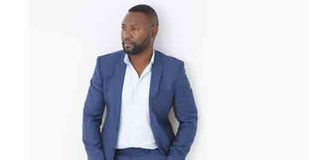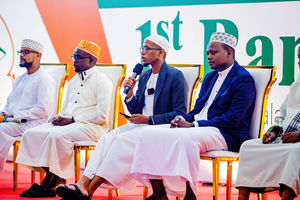I am still in the game says Mr Paul

What you need to know:
His shot brought some great hits such as ‘Ndani Ya Luv,’ ‘Zuwena,’ plus a couple of others.
He is considered as one of the first voices to make an attempt in make local RnB music.
His shot brought some great hits such as ‘Ndani Ya Luv,’ ‘Zuwena,’ plus a couple of others.
This week The Beat caught up with the singer in Sydney Australia where he is based.
It has been a while since we last heard from you what have you been up to lately?
It’s been a while indeed. I left Tanzania for Australia in some 10 years ago. A lot has happened since then. I got married in 2008, had two beautiful daughters Bahati in 2009 and Lulu in 2014, and did a Masters degree in Social Work at Melbourne University in 2012. I now work fulltime for the New South Wales State government. Probably this is the reason why I have been a bit quiet. I have, however, been playing music casually with my friends the Okapi Guitar Band around Sydney. So, I am still involved in music but not in the mainstream.
How best can you describe your musical journey to date?
Fantastic. A very interesting journey, I must say. There have been a lot of good things to cherish and a few disappointments that I would rather not dwell on. I am here because of music. I hardly say this to people, but Bongo Flava somehow paid tuition fees for my bachelor’s degree (BA Development Studies). I am grateful for everything that Bongo Flava has given me.
Can we still say that you are the same Mr Paul?
Certainly, I am still the Mr Paul you knew in the 90s, just a bit older than I was then. I haven’t lost my love and passion for the music. I still enjoy good Bongo Flava music, the company of others, a still humble and proud son of Sinza and Tanzania. I still have my voice and I can certainly write good music to this day.
In the early days how was the marketing system beneficial to you?
Yes and No. Yes- Marketing was appropriate given the context i.e. no social media or smart phones meant we needed more publicity in the newspapers, radio and Tv. I was fortunate to have MJ Production (Master J) and the Smooth Vibes (Ruge Mutahaba) by my side. So, I received lots of support at that time. As you know Smooth vibes is affiliated to Clouds FM and PrimeTime Promotions. So, there was enough promotion via their media outlets. For instance, the launching of the Ndani ya Luv album was a sold-out event at the Diamond Jubilee hall. We are talking about the year 2001-2002 before the social media and smart phones.
There were also genuine journalists, radio and TV presenters: Radio One & ITV, Radio Free Africa and Star TV, who wanted to Bongo Flava industry take off.
Print Media was also ready to back us up for free. Just for the love of it.
The downfall, however, was on the distribution side of things. It was an absolute nightmare. There were very few distributors who were rather unscrupulous in their dealings.
And yet again there was no legislation and political will for example copyright law was non-existent so artists were vulnerable to piracy from both the formal distributors and street vendors.
So no artiste in my generation made significant money from CDs and cassettes. I personally made most of my money through live shows and doing radio or television commercials.
So what can you says were the greatest achievements that you attained in music?
Bongo Flava was a good financial stepping stone for me. As you know I started music back when both our government and the society didn’t consider our form of art as a source of employment. It just wasn’t sufficient to guarantee a sustainable income. So, I had to acquire a “formal” qualification to be financially secure. I sold cars I bought from money earned from Bongo Flava and paid for my school fees. I now have two degrees and a permanent government job in Australia. I am much more financially secure now than I was back then. I have also made many friends along the way. I have had so much fun and have no regrets.
You are considered to be one of the pioneers of Bongo Flava, what do you think has changed between the early days and the current crop of artistes?
One thing I must say is that I am proud of what Bongo Flava has become today. It is fantastic to see how young people can create jobs for themselves, through music, and make beautiful living out of it. This is a significant change, we now have artistes who are more creative in their business dealings with excellent use of social media in the process promoting Swahili music to the world more than we could do. On the other hand, I have some criticism around the excessive use of auto tune to correct vocals etc. I find this disturbing as I grew up listening to songs with natural vocals. But this is a worldwide phenomenon.
What in your opinion was one of the impeding factors that prevented artistes from breaking through in Tanzania?
There were many factors which prevented artists from breaking through back then. For instance, we didn’t have high tech marketing strategies to connect us to millions of fans daily. Artists today have smart phones and social media such as Instagram, twitter, Facebook, iTunes, Spotify, SoundCloud and many more. You simply can do it all yourself and without a distributor in Kariakoo. We lacked these opportunities and were dependent on small scale marketing systems that couldn’t take us far enough.
When you broke through with ‘Ndani Ya Luv’ and later ‘Zuwena’, why do you think these songs were such sensations?
‘Ndani ya Luv’ was the first Swahili R&B slow track. So, it was a novelty and many young people liked the idea. As for Zuwena, it is self-explanatory. It was one of the most popular songs to be released in Tanzania and it is for this reason that people from all ages relate to it. But I think my version was such a sensation because it was done in Zouk which is more danceable than the Marijani Rajab version. It makes you want to dance even though it’s a tale of tragedy.
How do you think the sounds of then helped to shape today’s Bongo Flava?
I guess we became local contemporary music heroes or idols of some sort. Today’s generation of Bongo Flava artistes adopted our sounds because it is what they sang growing up. As a result, Bongo Flava hasn’t changed that much if you look at it closely. It is still characterised by a mix of western music and Swahili lyrics and melodies which is simply beautiful to listen to.
Back in the days you guys recorded albums which is quite the reverse of what is happening today. What is your take on this?
We did music in an era when people listened to cassettes, and it was more cost effective for distribution companies to produce a full-length cassette than the other way around. So, the pressure came from distributors rather than our managers or producers. It is much easier these days with the availability of digital music distribution to release singles.
Why do you think that some very good musicians of your era decided to hang up their boots when it was evident that they were still talented?
What a shame that had to happen. But as I mentioned before, the industry was merely starting then and it lacked the financial incentives and security to sustain our livelihoods. We had to obtain “formal qualifications or jobs” to pay rent and meet other financial demands. Most people left the country for that reason and never looked back.
Finally what is Mr Paul doing? Is it safe to say that you have quit music?
Oh no ,you haven’t seen my musical demise yet. I am actively involved in music and planning a comeback this year. I have finished three Swahili R&B songs and one of them will be released before Christmas this year. One song was done with Gulu Nanji of G Records Tanzania, and the rest were done with Mr Zux and John Laidler of Cut Snake Studios in Sydney.
If you had an opportunity of working with an artiste in Tanzania who would that be and why?
This is a tricky question. I listen to all Bongo Flava artistes so long as I think their songs are nice. However, I have become fond of Nandi’s songs recently, but I also like Ali Kiba, Rama D as well as Ben Pol. I just think these artistes have beautiful voices and do a style of music I can relate to. I personally would like to build connections with Bongo hip hop artistes as most of my songs would benefit from featuring them. I believe a mix of R&B and hip hop is always better than just R&B or Hip Hop





